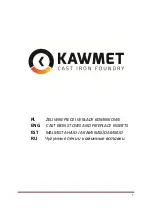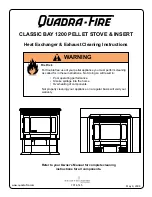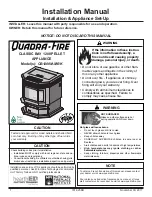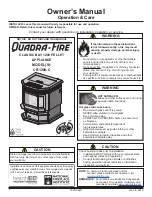
depending on a form and a cross-sectional size of a tube.
ATTENTION! Take necessary measures to protect eyes and anatomical airways from a dust and soot at the
time of a mechanical cleaning of chimneys.
ATTENTION! Read instruction through carefully and follow recommendation of a manufacturer of
chemical purifiers. Not recommend using compositions for carbon burning-off are self-made.
ATTENTION!
T
o avoid gas ducts clogging while cleaning the flue, you must disconnect the stove.
To prevent soot accumulation at the translucent screen (glass) it is necessary to clean it from time to time.
Accumulation of acidulous thin coating (of soot) will as the result erode and weaken the glass of the
translucent screen.
It is important to obey the following instructions so that the glass can be used for a long period of time.
On the regular basis inspect the glass for chips and cracks. Provided any cracks or chips are found immediately
put out the stove and address the manufacture for glass replacement issue.
Don't slam the door; don't otherwise hit the glass. When shutting the door make sure that billets and other
objects do not stick out from the fire chamber so that not to damage the glass.
Don't start up fire near the glass or in such a manner that during the burning process it may be close to the
glass.
When cleaning the glass do not use materials that can scratch or in other way damage the glass. Scratches on
the glass may during the use lead to glass destruction.
Never try to clean the glass while it is still hot. Before kindling the glass shall be completely dry.
Never put into the stove materials that can ignite explosively. Even small explosion in the closed space is
capable to smash out the glass.
Glass cleaning from sooty deposits shall be carried out as and when necessary by soft cloth wetted with special
solution for fireplace and stove glasses in accordance with the instruction.
It is prohibited to use the stove with damaged translucent screen. In case of glass damages for its replacement it
is necessary to install only high-temperature ceramic glass with thickness of 4 mm and correct dimensions. For
correct replacement order see cl.
9
.
Do not use instead of the glass the heat-strengthened glass or thickened window glass. Contact the
manufacturer for the glass replacement issue.
The firebox protection with the grate
in it and heat exchanger tank ar
e exposed to the highest temperature, so
the metal
they are made
of may deform or burn
out
during the operation
time.
Should this happen, the damaged
parts must be replaced. Such
damage occurs due to improper use of the
stove
and is not covered by warranty.
To replace a
damaged protecti
on you should
:
1. Remove the damaged protection from the stove by bending
the metal
clamps
on the
firebox sides
;
2. Set a new protection in the stove
.
The firebox protection must be set in the lower part of the firebox
and
t
he grate placed closer to the rear wall. The grate is set in a seat in the protection turned with its flat side
to the firebox
.
To replace
the
heat exchanger tank
,
first, loosen the nuts on the
connections on the exterior side of a rear convector
(see. Fi
gure 16)
and
take
out the heat exchanger tank
from
the stove
through the door.
Put
spacer sleeves
on the connection between the firebox
wall and the
convector to prevent convector damage
while tightening the nut. Non-
combustible gasket
, which is
placed on the connection
, should be placed
on the inside of the
firebox
.
In operation, the sealing cord
in the stove door and
the ash drawer
gasket wear
out,
that reduces the tightness when closing
. The manufac-
turer recommends that you
should periodically replace them. This damage
(wear and tear) is not covered by warranty.
8
.2. Service maintenance of door translucent screen
9. PREVENTIVE MAITENANCE
Heat exchanger
tank
Sleeve
Nut
Convector
Connection
Figure
16.
Heat exchanger removal
Non-combustible
gasket
Summary of Contents for Battery Fire 11
Page 1: ...Battery Fire USER MANUAL ...



































